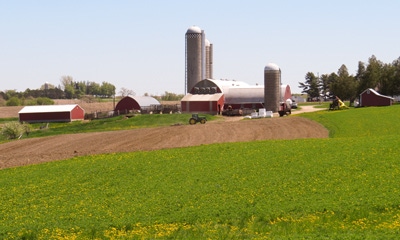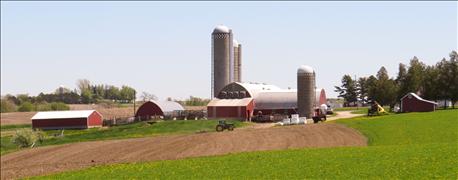September 16, 2016


CASH-FLOW ANALYSIS: Do an analysis on your costs and how you will deal with cash flow when prices decline.
Question: My 26-year-old son and I farm 1,400 acres in western Wisconsin. We grow crops on 1,200 acres and have a cow-calf operation with 50 Angus cows and their offspring. We began tightening our belts three years ago when crop prices dropped. Now with low beef prices for the past year, we’ve really cut expenses to the bone to keep farming. I am wondering, after the harvest this fall, if my son should take a full-time job off the farm. We could let the rented land go and cut back to farming just the 750 crop acres we own. My son could still help me on weekends during calving and planting. I owe $350,000 on a neighboring farm I bought in 2004, and we owe about $25,000 on parts and repairs. With great crop yields, we will just about break even this year, but there is nothing for family living, and we have to eat, too. Please advise.
Hodorff: In my view, you need to make some decisions for your future. I would be careful when considering letting your rented land go. First, it will raise your costs because you will be using your machines on fewer acres. Second, if you let rented land go, you will have a hard time renting land at a later date.
As a short-term fix, off-farm income could be a solution. My bigger concern is your long-term plan. You have short-term bandages. Take some time to do a longer-range business plan. Do an analysis on your costs and how you will deal with cash flow when prices decline. It seems your equity position is good, so you may have some more opportunity on the expense side.
Miller: I commend you for analyzing the status of your business and thinking through options to improve your financial position. You did not mention what your son thinks about the plan. Set up a family meeting to ask him for his thoughts and explore other possibilities. Additional options could include: taking on some custom work, selling excess equipment, growing specialty crops for a higher return, and analyzing your returns on owned vs. rented land to determine if this is the correct strategy.
You may want to ask an Extension ag agent or farm technical college trainer to assist in identifying options and exploring the pros and cons of each prior to making any decisions. You’ve made a positive step by identifying the issues. Putting some work into exploring your options can guide you to improve both your financial situation and your peace of mind.
Wantoch: When times get tough, you need to look at every detail to see if you can meet your bottom line. It sounds like you have taken the time to calculate the breakeven for your farm operation, and that's a great first step. Now comes the hard part: making those decisions on what to cut. It sounds like you have put some thought into this already. Your son seeking off-farm employment would reduce labor costs and still be able to provide some help for the farm when needed.
I would encourage you to look at your breakeven with and without the rented acres. You or your son may not be able to rent this farmland in the future, and you need to be sure you can be profitable on your owned acreage. Other options that you could consider would be to increase the cow-calf operation or look to complete custom harvesting for neighbors. After you have reviewed and made some decisions, be sure you are talking to your banker, especially if you are struggling to make your loan payments. They may be able to assist you with your cash-flow situation by adjusting your payments or re-amortizing your loan.
Agrivision panel: Doug Hodorff, Fond du Lac County dairy farmer; Sam Miller, managing director, group head of agricultural banking at BMO Harris Bank; and Katie Wantoch, Dunn County Extension agriculture agent specializing in economic development. If you have questions you would like the panel to answer, send them to: Wisconsin Agriculturist, P.O. Box 236, Brandon, WI 53919, or email: [email protected].
You May Also Like




